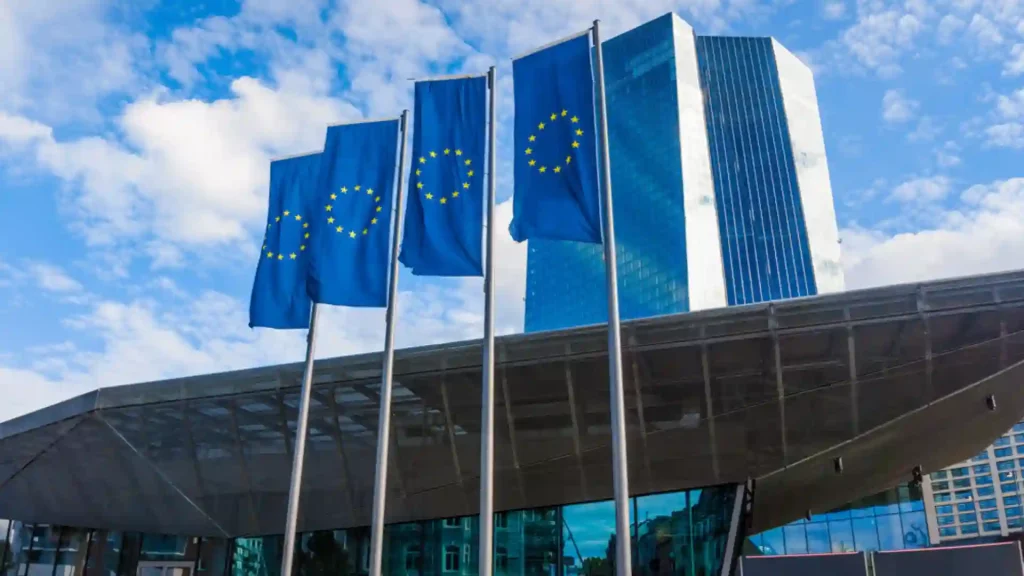Revised growth figures from Germany and Ireland reveal that the Eurozone has fallen into recession. Though earlier estimates had reported a mild growth of 0.1%, the new figures show that worse-than-expected performance from Germany and Ireland means that the bloc’s economy actually shrank by 0.1% in the first quarter of 2023. This mirrors falls in consumer spending, government spending, and exports.
With a decline of 0.2% in the last quarter of 2022, the Eurozone is officially in recession. While this is unlikely to last long, with some predicting growth returning this quarter, it highlights that the Eurozone’s economy is stagnating in the face of several challenges, which include unrelenting inflation, weak consumer demand, rising interest rates, the Russia-Ukraine War, and a slowing global economy.
The economic data differs quite strongly from country to country, however. Some southern countries have posted strong growth figures, while France hovers between stagnation and mild growth. Economic heavyweights Germany and Netherlands shrank a little, though, by far, the hardest hit has been Ireland – reporting a decline of 4.6%. The United Kingdom, while no longer a member, is also in dire economic straits. Though it managed to avoid a recession, it continues to suffer from high inflation and the aftereffects of Brexit.
The Eurozone faces many economic challenges
The most significant challenge the continent faces are high energy and food prices. While the Eurozone has successfully managed to avoid a catastrophic energy shock by replacing Russian gas with LNG from places like the USA or Qatar, inflation is still too high at 6.1%. Even though this is significantly lower than last year’s peak of 10.6%, household consumption within the Eurozone has fallen by 1% and 0.3% over the last two quarters, respectively.
As governments have focused on limiting the impact on citizens, businesses have suffered, with costs too high to stay competitive. The energy-reliant aluminium and chemicals industries have been hit hardest. German chemical giant BAF announced it was permanently downsizing in Europe, and several aluminium smelters were shutting down. Despite the bloc’s best efforts to bring back manufacturing, the continent is seeing significant de-industrialisation.
The European Central Bank, in a bid to rein in inflation, has initiated a contractionary monetary policy. Interest rates have risen by 3.75%, and though this has moderately affected inflation, it is now limiting investment. With another 25-point increase due next week, businesses are finding it harder to borrow, even as they deal with higher costs and lower sales.
Events outside the continent have also played a role. A stagnating global economy, including a slowing America and weak post-lockdown recovery in China, have limited trade with two of the Eurozone’s biggest trade partners. Many Eurozone countries, including its biggest economy, Germany, depend on exports to fuel economic growth. Unfortunately, economic nationalism is on the rise globally as countries seek to restore production, which limits that avenue as well for now.
Europe’s Economic Future
The new data has put a question mark on forecasts of a strong European recovery. The European Commission had earlier forecast economic growth of 1.6% this year, but that now seems unlikely. Economist Charlotte de Montpellier of ING Bank now anticipates a lower growth figure of just 0.5% in 2023.
The Eurozone cannot truly recover without the two main economic engines of France and Germany. Weak demand and industrial production mean Germany is in recession, and a stagnant France is wracked by pension protests. Until these two countries get their act together, the Eurozone is unlikely to have a strong recovery. Europe never really recovered from the last crisis in 2008, and it will need to navigate its current economic and geopolitical dilemmas deftly if it wishes to avoid another decade of stagnation.
